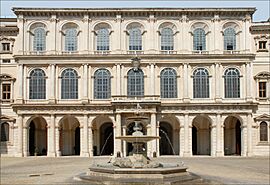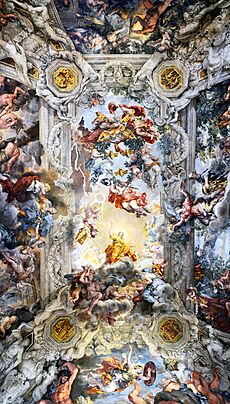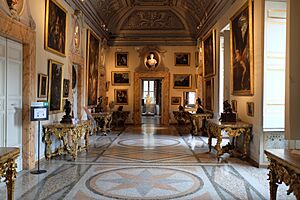Galleria Nazionale d'Arte Antica facts for kids

Facade of the Palazzo Barberini
|
|
| Established | 1893 |
|---|---|
| Location | Palazzo Barberini, via delle Quattro Fontane, 13 () Palazzo Corsini, Via della Lungara 10 () Rome, Italy |
| Visitors | 153,549 |
The Galleria Nazionale d'Arte Antica is a fantastic art museum in Rome, Italy. Its name means 'National Gallery of Ancient Art'. This museum holds a huge collection of old paintings, mostly from before the year 1800. It's a great place to see famous artworks!
The museum is actually in two different, beautiful buildings: the Palazzo Barberini and the Palazzo Corsini. Both palaces are amazing to explore.
You can see paintings by very famous artists here, like Bernini, Caravaggio, van Dyck, Holbein, Fra Angelico, Filippo Lippi, Raphael, Tintoretto, and Rubens.
Contents
Discovering the Palazzo Barberini

The Palazzo Barberini was built a long time ago for Pope Urban VIII. He was a member of the powerful Barberini family. A famous architect named Carlo Maderno designed this grand palace.
One of the most incredible parts of the palace is the ceiling of its main hall. It was painted by Pietro da Cortona. This huge painting is called the Allegory of Divine Providence and Barberini Power. It's a stunning artwork that celebrates the Barberini family.
Over the years, the museum's collection grew a lot. Many paintings were bought or given as gifts. For example, large collections like the Torlonia and Chigi collections were added.
Famous Artworks at Palazzo Barberini
The Palazzo Barberini is home to many masterpieces. Here are some of the highlights you can see:
- Caravaggio:
- Judith Beheading Holofernes (painted around 1599)
- Narcissus (painted around 1599)
- Hans Holbein the Younger:
- Portrait of Henry VIII
- Filippo Lippi:
- Madonna of Tarquinia (painted in 1437)
- Lorenzo Lotto:
- Mystical Marriage of Saint Catherine of Alexandria and Saints (painted in 1524)
- Raphael:
- La Fornarina (painted between 1518 and 1519)
- Titian:
- Venus and Adonis (painted around 1560)
Many other great artists also have works displayed here, including Bernini, Canaletto, El Greco, Guercino, Nicolas Poussin, and Tintoretto.
Exploring the Palazzo Corsini
The Palazzo Corsini is another amazing palace that houses part of the museum. It was originally built in the 1400s. Later, in the 1700s, it was rebuilt by an architect named Ferdinando Fuga. This palace was once owned by Cardinal Neri Maria Corsini.
Most of the art in the Palazzo Corsini came from the Corsini family themselves. They were big art collectors in the 1600s. It's like stepping into a grand private art collection from centuries ago!
Key Artworks at Palazzo Corsini
The Palazzo Corsini features many important paintings. Here are some of the famous artists and their works you can find:
- Beato Angelico:
- Triptych of the Last Judgement
- Caravaggio:
- Saint John the Baptist
- Orazio Gentileschi:
- Madonna and Child
- Bartolomé Esteban Murillo:
- Madonna and Child
- Mattia Preti:
- The Tribute Money
- Peter Paul Rubens:
- Saint Sebastian Tended by Angels
- Jusepe de Ribera:
- Venus and Adonis
This museum is a fantastic place to learn about art history and see some of the world's most beautiful paintings up close!
See also
 In Spanish: Galería Nacional de Arte Antiguo para niños
In Spanish: Galería Nacional de Arte Antiguo para niños
- Paintings in the Galleria Nazionale d'Arte Antica
- List of national galleries
 | Claudette Colvin |
 | Myrlie Evers-Williams |
 | Alberta Odell Jones |


